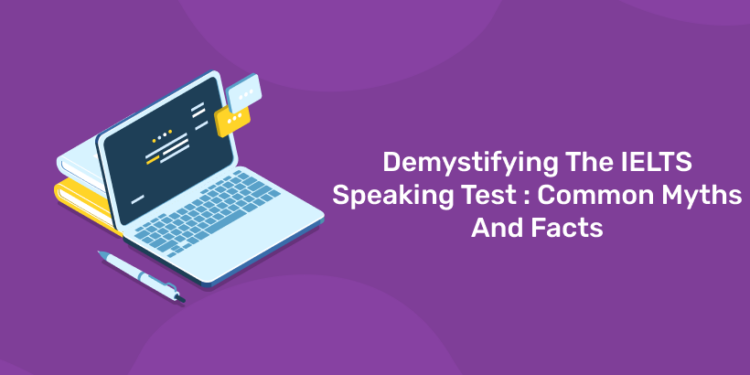Table of Contents
The IELTS Speaking Test is a vital component of the International English Language Testing System (IELTS). As one of the four sections of the exam, it assesses your ability to communicate effectively in English through face-to-face interaction with an examiner. Over the years, several myths have circulated about this test, leading to misconceptions and unnecessary anxiety among test-takers. In this article, we aim to debunk these common myths and present essential facts to help you prepare confidently and excel in the IELTS Speaking Test.
Myths of The IELTS Speaking Test
Here are some common myths of the IELTS Speaking Test
Myth 1: The Speaking test is simple & easy to score
Fact: The Speaking test is all verbal and you do not need to do any writing, however, like all other parts of the IELTS test, it does come with its own challenges that require ample practice. Depending on your preference and unique situation, you might find the speaking test simpler but the evaluation criteria go beyond just holding a simple conversation.
Myth 2: Fluency Matters More Than Accuracy
Fact: While fluency is essential in the IELTS Speaking Test, accuracy is equally significant. Examiners evaluate both aspects of your language use. Fluency reflects how smoothly and naturally you can express yourself, while accuracy assesses your grammatical correctness and proper use of vocabulary. Aim for a balance between fluency and accuracy to maximize your speaking score.
Myth 3: Using short & simple sentences means making fewer mistakes
Fact: Using simpler sentences might seem like a good strategy, but you are also being evaluated on how you link ideas together plus your grammatical range and sentence structuring. It reduces your ability to use clauses, verbs and time clauses. Shorter and simple sentences limit your ability to really shine and stand out in the conversation and would probably leave the examiner little choice but to mark you down.
Myth 4: Being polite & courteous will help to score better
Fact: Being polite, courteous and smiling should be part of basic manners when engaging with anyone in a conversation. It does help the interaction move forward, however, it is not part of the evaluation criteria. You should not worry about being overly polite but focus on the conversation and topic at hand.
Myth 5: You need to have a native-like accent to get a high score
Fact: Your accent is not an evaluation criterion. Pronunciation is assessed, but you are not expected to have a native accent. When evaluating pronunciation, examiners pay attention to the candidates’ pronunciation of individual sounds, word stress and intonation.
Myth 6: If you don’t know the answer to a question, you cannot get a high score
Fact: Your knowledge of certain topics is not tested on this exam. The examiners are more interested in how you say things than what you say.
If you don’t know the answer to a question, explain why you don’t know. There is no “right” or “wrong” answer.
Myth 7: If you’re very good at grammar, you’ll do well
Fact: Grammar is just one of the four evaluation criteria used to give you a score in the speaking test. The others are fluency and coherence, lexical resource (vocabulary range) and pronunciation.
All of them are equally important. So if you are very good at grammar, one fourth of your final score will definitely be high. But if you want an overall high score, you need to also prove you have a wide vocabulary range.
Myth 8: Speaking in a particular accent will help you score more
Fact: This is arguably one of the worst IELTS myths you will come across, despite appearing natural on the surface. IELTS is a global language proficiency exam. Examiners are aware of your nationality and take note of your accent. Talking in an American, British or Australian accent has nothing to do with the score they will be getting in the speaking section. So, the focus should be on speaking clearly with the use of the correct vocabulary.
Myth 9: If you don’t hesitate when speaking, you’ll make a good impression
Fact: Fluency is important, but so is coherence (being logical, making sense). Trying to avoid hesitation is a good tip, but you also need to keep your answer logical and organized.
If you keep talking and talking without making much sense, you are fluent, but you are not coherent. Fluency (talking smoothly without hesitations) on its own will not make a good impression. You also need to speak coherently (logically, organized).
Remember, though, that some hesitations are normal. You are not supposed to speak without breathing or thinking. Try using some of these filler phrases to make your hesitations sound more natural:
- To put it differently…
- What do you call it…wait a second…I have it right there.
- Well…
- You see…
Myth 10: Level of difficulty varies from one nation to another
Fact: Several students believe this IELTS myth that the questions on the test are easier or more difficult than in other nations. The IELTS test questions are tested with test takers worldwide before they are certified, which attests to the impartiality with which the IELTS exam is administered.
Myth 11: You should try to match the opinions of the examiner
Fact: This is one of the most common IELTS myths that students believe in. Students assume that if they agree with the examiners, they will score higher on the speaking test. It is false because the test does not judge political correctness or a test taker’s point of view. The ability to explain oneself in English is the main determinant for evaluating test takers. It is a language test, and one must understand that one’s point of view is irrelevant.
Myth 12: Giving more information will give more marks in speaking
Fact: This is another common IELTS myth that students believe in; This myth is completely false. There are various scenarios where a student begins to provide more information than is required for a specific type of question. You should always stick to the question and limit your answers to the scope of the question.
Myth 13: Use special words to show off your vocabulary
Fact: This IELTS myth can be misleading for many students as it can be seen as a true statement. You can use fancy words, but the exam is about your English language skills, so you should only use words related to the given topic.
Myth 14: Speaking is the most important component of the IELTS
Fact: Students frequently believe IELTS myths, such as this one, that students should give one module less importance than the other, which is incorrect. Speaking, listening, writing, and reading are equally important modules because the overall score, as well as all components above a specific band, are crucial. Don’t overburden one module or spend too much time on another. All of the components function together.
Myth 15: Speaking Test is Only About Pronunciation
Fact: Pronunciation is indeed crucial as it impacts how easily others understand you. However, the IELTS Speaking Test assesses various language skills beyond pronunciation. Examiners consider your vocabulary range, grammar, coherence, and cohesion in responses. So, focus on improving all aspects of your speaking to achieve a higher score.
Myth 16: Using Complex Vocabulary is Necessary for a High Score
Fact: While incorporating advanced vocabulary can enhance your responses, it is essential to use words and phrases that you are comfortable with and can use accurately. Excessive and incorrect use of complex vocabulary may have a negative impact on your score. Demonstrating precise and appropriate language use is more important than showcasing an extensive vocabulary.
Myth 17: The Examiner Is There to Trick You
Fact: Examiners are not out to trick candidates. Their role is to conduct a fair and unbiased assessment of your language proficiency. They will ask questions that allow you to showcase your abilities, and their friendly demeanor is meant to put you at ease during the test.
Myth 18: Speaking More Leads to a Higher Score
Fact: Lengthier responses do not guarantee a better score. The IELTS Speaking Test assesses quality over quantity. It is essential to provide relevant information and answer questions directly and coherently. Elaborate on your answers when necessary, but avoid unnecessary verbosity.
Myth 19: The Examiner Determines Your Band Score Immediately
Fact: The examiner’s role is to conduct the interview and assess your performance. The final band score is determined based on specific assessment criteria and is reviewed by experienced examiners to ensure consistency and fairness.
Myth 20: Memorizing Prepared Answers Guarantees a High Score
Fact: Memorizing scripted responses is discouraged in the IELTS Speaking Test. Examiners are trained to recognize prepared answers, and relying on them can lead to lower scores. The test aims to evaluate a candidate’s spontaneous speaking skills, so it’s best to practice discussing a wide range of topics instead of memorizing specific answers.
CRACK IELTS EXAM WITH ENTRI APP ! ENROLL FOR FREE DEMO VIDEO !
Facts About IELTS Speaking Test
Here are some facts that you should know about IELTS preparation.
- In IELTS speaking test your speaking ability is tested. In this your fluency and ability to have communication is checked and also will test how effectively you can talk in the language.
- For this test you need confidence. If you lose confidence the chance of making mistakes will increase. If you are confident you will get mote ideas and will get rid off hesitation. So to be confident you need to practice on daily basis.
- Pronunciation is another fact that plays an important role in IELTS speaking test. During exam the examiner will check your pronunciation. So it is necessary to work on the words you pronounce wrongly and don’t try to use new words in the exam that you can’t speak correctly.
- Fluency is another fact that is checked during the test. Many candidates try to fool the examiner by speaking very fast as they think fast speaking will make them sound fluent. When you speak fast, the examiner will not understand as a result it will affect your score.
- Maintaining an eye contact with the examiner is another fact. It will not only help you to be confident but also let you know about the mood of the examiner. It also helps you to know when the examiner wants you to stop or continue with the same question especially in cue cards examiner shows his hands in between to stop and you can see his action when you will be looking at him.
In conclusion, understanding the truth behind these common myths will help you approach the IELTS Speaking Test with confidence and a clearer perspective. Remember that the key to success lies in consistent practice, improving your language skills holistically, and staying calm and composed during the exam. Familiarize yourself with the test format, take advantage of practice materials, and seek feedback from teachers or language partners to enhance your speaking abilities. By debunking these myths and focusing on the facts, you can effectively demystify the IELTS Speaking Test and achieve your desired band score.
| Related Links | |
| All About IELTS Exam | IELTS Reading Practice Test |
| IELTS Listening Practice Test | IELTS Writing Practice Test |
| IELTS Speaking Practice Test | Vocabulary in IELTS |










